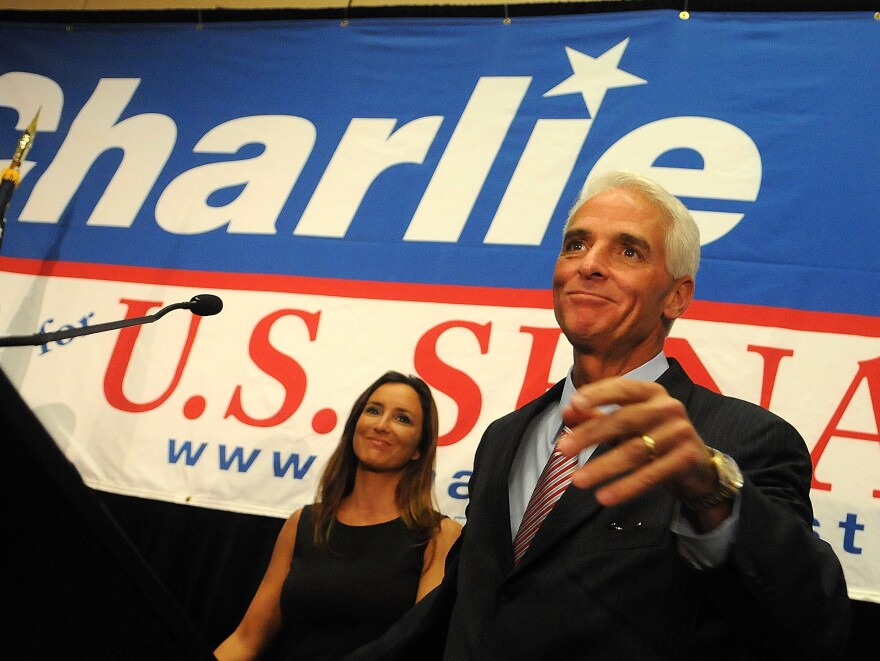There's a lot of glory in switching parties, but often not much future.
Both major parties are giving prominent speaking roles to political apostates at their conventions. On Tuesday, Artur Davis — a former Democrat and a former congressman from Alabama — condemned President Obama during a speech at the Republican National Convention in Tampa, Fla.
"America is the land of second chances," said Davis, who had seconded Obama's nomination four years ago at the Democratic convention. "And I gather in this close race you have room for the estimated 6 million of us who got it wrong in 2008 and want to fix it."
Democrats will turn the tables next week at their convention in Charlotte, N.C., featuring at the podium former Florida Gov. Charlie Crist. Elected as a Republican, Crist found himself at the losing end of a 2010 Senate primary battle against Marco Rubio.
Crist ended up staying in the race as an independent, but Rubio won easily. Still, Democrats will be glad to showcase Crist as a disillusioned Republican.

"I'm confident that President Barack Obama is the right leader for our state and the nation," Crist wrote in a Tampa Bay Times op-ed on Sunday. (Rubio remarked the next day that Crist is "running out of political parties.")
"You're showing that this ticket is attractive enough that it is making converts of people who had long ties to the opposite party," says Charles Bullock, a political scientist at the University of Georgia.
Once startling, giving time over to turncoats has become almost a convention tradition in recent years. In 2008, Democrats gave a prime speaking role to former Rep. Jim Leach, an Iowa Republican who now serves as chairman of the National Endowment of the Humanities.
That same year, Sen. Joe Lieberman — who had been the Democratic nominee for vice president in 2000 and ran as a Democrat for president in 2004 — gave a speech strongly endorsing his friend, Arizona Republican Sen. John McCain.
Former Georgia Gov. Zell Miller delivered the Democrats' keynote address in 1992, and performed the same function for Republicans in 2004, offering a blistering attack against Democratic Sen. John Kerry of Massachusetts.
"It serves the interests of the party promoting them," says Hal Bass, a political scientist at Ouachita Baptist University in Arkansas. "But I'm not sure how well it serves the interests of the speaker himself."
The reason is that even if party leaders welcome switchers with open arms — offering high-profile speaking gigs or, to sitting legislators, committee chairmanships — rank-and-file voters may reject the turncoats.
That happened to former Sen. Arlen Specter, who is currently battling cancer. He had served Pennsylvania as a Republican for five terms before switching to the Democratic side in 2009, helping to give his new party a filibuster-proof, 60-seat majority.
His reward? He was defeated in the Democratic primary the following year.
The same fate befell Rep. Parker Griffith of Alabama, who bolted Democratic ranks in 2009 out of anger over Obama's health care law, only to lose in the GOP primary a few months later.
"They find themselves not trusted by the people they're embracing and condemned by the people they're leaving," says Bass.
Lieberman himself lost his party's Senate nomination in 2006, but defended his seat successfully as an independent. He's retiring this year. Vermont Sen. Jim Jeffords, a former Republican, became an independent in 2001, giving Democrats a majority in the Senate. He never faced voters again.
There have been politicians who have switched parties and enjoyed sustained success, including many former Southern Democrats who became Republicans. That historic shift had its roots at the 1948 Democratic convention, when South Carolina Sen. Strom Thurmond bolted the hall. He ran for president that year as head of the Dixiecrats but eventually joined the GOP.
Numerous Southern Democrats have made the switch to the Republican side over the years since. Many, unlike Griffith, have prospered, including Sen. Richard Shelby of Alabama and Gov. Nathan Deal of Georgia.
"For Shelby and Deal, that was probably the best thing they ever did for their careers," says Merle Black, a political scientist at Emory University.
Black says he doesn't know whether Artur Davis will be embraced as a candidate by Alabama Republicans, but notes Davis didn't have much of a home in the Democratic Party. He was the only African-American Democrat to vote against Obama's health law, and he lost the party's gubernatorial primary in 2010.
Black says there's no question Republicans will want to hear more from this African-American ex-Democrat willing to criticize Obama and embrace the GOP. "He'll be in big, big demand to speak at Republican events all over the country," he says.
Copyright 2021 NPR. To see more, visit https://www.npr.org.



